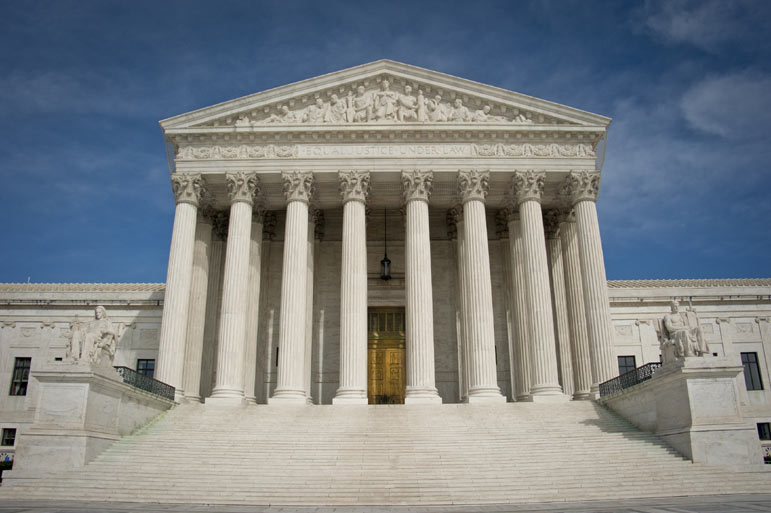
Filing a friend-of-the-court brief to the Supreme Court sounds like an act of spontaneous intellectual generosity meant to help the justices see all sides of a case. Or maybe an exercise in lobbying by interest groups.
Actually, it's neither. A new article by two law professors shows that an organized business they dub the "amicus machine" generates hundreds of amicus curiae briefs, planned and coordinated by the specialized guild of lawyers who argue before the court.
Surprisingly, the authors think the machine is a good thing. They say it weakens the excessive influence of the solicitor general, helps the court's law clerks find good cases and helps the justices announce broad rules of law.
I don't agree that these benefits - if they're benefits at all -- outweigh the costs. The amicus machine is part of a system that pushes the justices to the sidelines and lets law clerks, past and present, take over the court's jurisprudence.
Start with a quick description of the machine. It involves at least two roles: the "amicus wrangler" (a term coined by Kathleen Sullivan, a former law school dean and professor with whom I co-author a constitutional law casebook), and the "amicus whisperer" (a term coined by Pamela Karlan of Stanford Law School). The wrangler coordinates who will write a friend-of-the-court brief and which interested non-parties they should represent. The whisperer coordinates the messaging.
To a non-specialist, all this is largely invisible. It's not a coincidence that Sullivan and Karlan invented the terms used by the article. Both are brilliant scholars and litigators who belong to the elite of the Supreme Court bar.
This opaque practice is a great way for the participants to scratch each other's backs, as I've suggested before.
But that's not what's fundamentally wrong with it. The real problem is that amicus briefs are a kind of currency circulating among present and former law clerks.
The main reason for this is that the justices don't read amicus briefs, as several justices have said openly. The law clerks do. The authors of the briefs know this. So they write for the clerks, not for the justices.
Why bother to write briefs aimed at clerks, who don't decide the cases? The simple answer is that clerks draft most of the court's opinions.
Sure, the justices start by telling them how the decision should come out, and usually add a general line of reasoning. And the justices rewrite extensively, infusing the decisions with their distinctive voices, especially in high-profile cases and dissents. But much of the text of the opinions - and certainly the citations - are produced by the clerks.
Clerks have a hard job, and believe it or not, they're modest about inventing arguments that will live forever in the official Supreme Court record (you'd be, too, if you were two or three years out of law school). If a brief gives clerks guidance on how to frame an issue, they'll gratefully take it. It's much safer to rely on a former solicitor general or another famous litigator than to argue on your own.
Amicus briefs, therefore, while intended to give people who aren't parties to a case a way to raise relevant legal issues, become tools for clerks to cite and use. They're both a cause and a symptom of why the court's opinions are bizarrely, insupportably long. When the justices were writing opinions themselves, the texts were often succinct and short, reflecting their workload but also their confidence. Clerks, by contrast, feel a need to address and refute every argument raised by the briefs - because they lack the authority or confidence to ignore claims made by the sophisticated Supreme Court bar.
There's a further twist.
Who drafts the amicus briefs? Not the famous lawyers who sign them. No, that work is done by - you guessed it - former Supreme Court clerks working as apprentices in the offices of major court litigators. After a clerkship, the plum job for a clerk who doesn't want to go into government or academia (or just hasn't gone down those roads yet) is to take a large clerkship bonus and go to work for an appellate litigation operation lodged inside a major law firm. Within the firms' appellate groups, the plum assignment is, of course, Supreme Court litigation.
The upshot is that the amicus machine consists of former clerks writing for current clerks -- who understand exactly what's going on. When they cite an amicus brief, they're encouraging the industry that's about to hire them.
All this may help the clerks find worthy cases for the court. It may even dilute the influence of the solicitor general, although I tend to doubt it, since the justices and clerks know the SG's office in the Justice Department isn't paid by clients and tries to maintain some degree of remove from the fray.
But the real costs of the system lie in the way it shifts responsibility from justices to clerks.
I've got no beef with clerks, mind you. Some of my best friends are former Supreme Court clerks. They're excellent lawyers and (for the most part) upstanding people. I'm one myself.
But clerks shouldn't become the makers of constitutional law. To be more precise, the justices should exercise more direct authority over the text of their opinions. They should keep opinions short to make them accessible and meaningful to the public and to lawyers. The amicus machine makes that harder. Its existence may not be a scandal, but it's a problem.
Comment by clicking here.
Noah Feldman, a Bloomberg View columnist, is a professor of constitutional and international law at Harvard University and the author of six books, most recently "Cool War: The Future of Global Competition."


 Contact The Editor
Contact The Editor
 Articles By This Author
Articles By This Author
